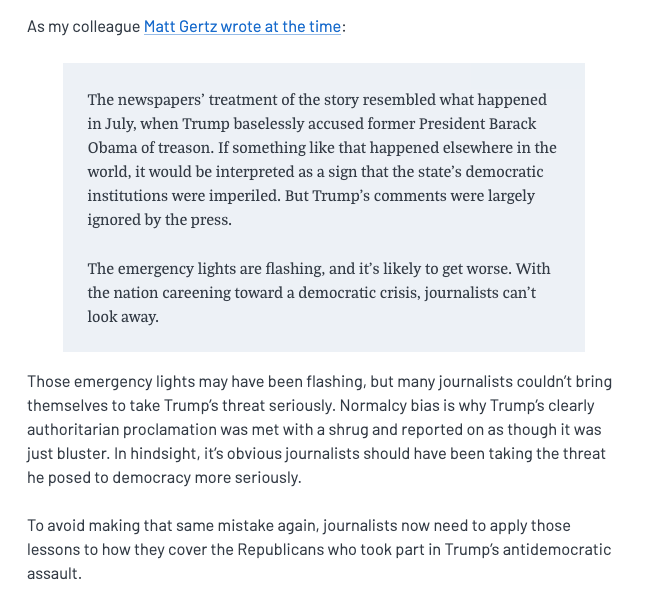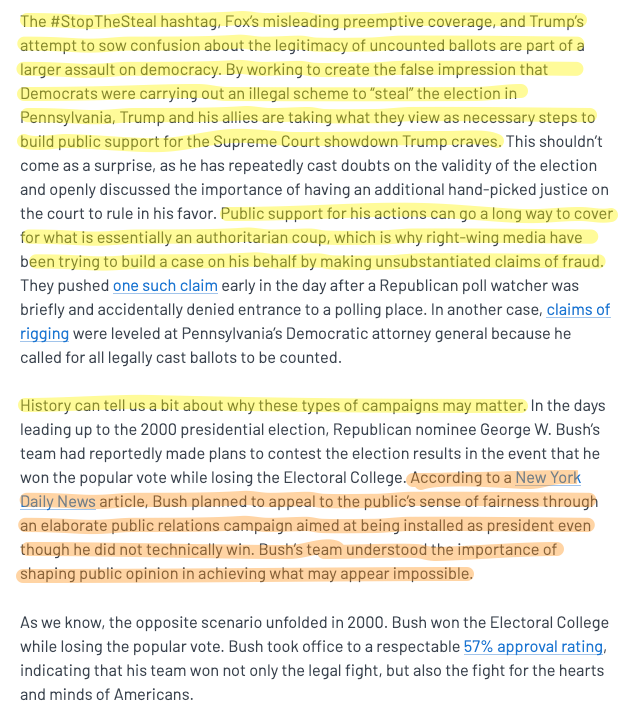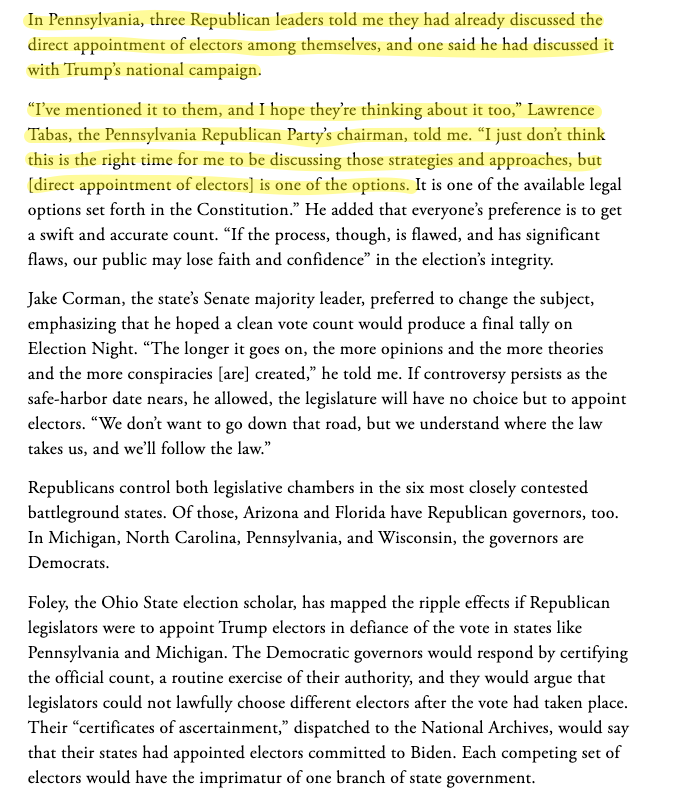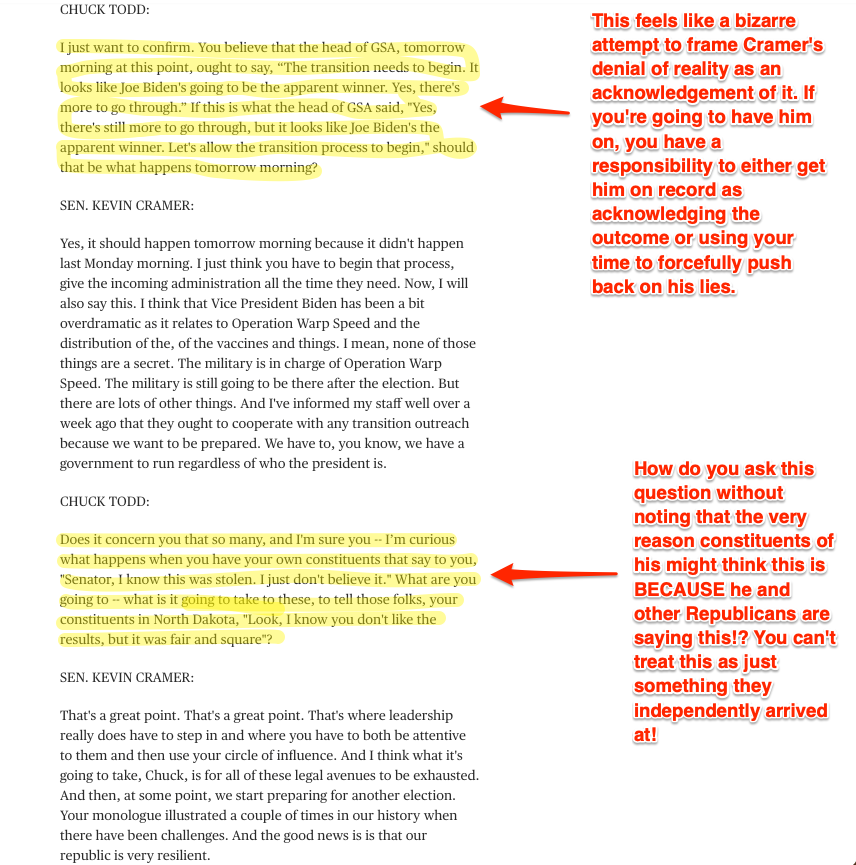My latest at @mmfa:
Never, ever, ever let Trump's accomplices live down their attacks on democracy. https://www.mediamatters.org/voter-fraud-and-suppression/never-let-trumps-accomplices-live-down-their-attacks-democracy
Never, ever, ever let Trump's accomplices live down their attacks on democracy. https://www.mediamatters.org/voter-fraud-and-suppression/never-let-trumps-accomplices-live-down-their-attacks-democracy
One thing I kept thinking about as I was writing this was just how much normalcy bias there is in media. There's this aversion to describing things as they are, and instead opting to describe the world as it *has been*
For instance, in September, Trump was asked specifically if he would ensure a peaceful transition of power. All he had to say was "Yes, of course," or "Hopefully I'll win" or something like that. Instead he talked about the need to "get rid of the ballots."
The next day, NYT's print edition buried the story on page A15. WaPo and WSJ put it on A4. LA Times put it on A6. Other papers didn't include it at all.
That should have been *huge news,* but it was met with a shrug.
https://www.mediamatters.org/donald-trump/major-newspapers-bury-trumps-refusal-commit-peaceful-transfer-power
That should have been *huge news,* but it was met with a shrug.
https://www.mediamatters.org/donald-trump/major-newspapers-bury-trumps-refusal-commit-peaceful-transfer-power
Then the election happened, Trump lost, and... did exactly what he said he would do, refusing to acknowledge his defeat and fighting it with a series of frivolous lawsuits.
On election day, I started writing this piece about the specific rallying cry people would probably use as they tried to steal the election in Trump's favor. https://www.mediamatters.org/jack-posobiec/right-wing-influencers-are-using-stopthesteal-hashtag-buoy-trumps-attempts-undercut
This isn't even a Trump thing. This is a Republican Party thing. Back in 2000, the Bush campaign thought they might win the popular vote and lose the electoral college (the opposite of what eventually happened). They started working on a PR strategy to try to get installed.
There's such a tendency to brush off legitimate threats as ridiculous. The way many people responded to this @bartongellman article from September is a good example. People called it "fear porn," said he was being over-the-top, etc. https://www.theatlantic.com/magazine/archive/2020/11/what-if-trump-refuses-concede/616424/
But reading it back, it's just a straightforward description of Trump's post-election strategy. https://www.theatlantic.com/magazine/archive/2020/11/what-if-trump-refuses-concede/616424/
It really is amazing how much that article was shrugged off when it was first published given that it laid out exactly what the Trump campaign would end up trying. https://www.theatlantic.com/magazine/archive/2020/11/what-if-trump-refuses-concede/616424/
I recently went back and re-read the book "How Democracies Die" (I definitely recommend it).
At the very front of the book, there's a paragraph about how attacks on democracies are often "legal" in a technical sense.
At the very front of the book, there's a paragraph about how attacks on democracies are often "legal" in a technical sense.
And often, people carrying out these powergrabs will frame their actions as being pro-democratic reforms. (see: anytime Trump's team talks about the importance of "free and fair elections" while calling for millions of ballots to be thrown out.)
Here's a link to that book: https://www.penguinrandomhouse.com/books/562246/how-democracies-die-by-steven-levitsky-and-daniel-ziblatt/
Back to my article. https://www.mediamatters.org/voter-fraud-and-suppression/never-let-trumps-accomplices-live-down-their-attacks-democracy
Expect to see more Republicans who joined Trump's attempts to overturn an election he very clearly and fairly lost try to retcon their own role in it. Crenshaw did this last week, misrepresenting what the brief he signed onto said.
Expect to see more Republicans who joined Trump's attempts to overturn an election he very clearly and fairly lost try to retcon their own role in it. Crenshaw did this last week, misrepresenting what the brief he signed onto said.
What this requires, for the sake of the future of democracy and the future of a free press, is for people in media to hold Trump's accomplices to account.
This means the end of the friendly Sunday morning talk show chit-chat. It has to.
This means the end of the friendly Sunday morning talk show chit-chat. It has to.
Watching the Sunday morning talk shows, it's become depressingly routine to see people who *to this very day* do not recognize that Trump lost the election, being interviewed either about something unrelated to this or asked about it in a way that legitimizes their lies.
Journalists shouldn't invite people on to make objectively false, disproven claims about things like whether or not vaccines cause autism (they do not) or whether Obama was born in the U.S. (he was).
Have members of Congress on, but don't become a vector of misinformation.
Have members of Congress on, but don't become a vector of misinformation.
Here's an example of how not to talk about what Trump and the majority of House Republicans are trying to do.
"Talk about another awkward day..."
That's how you discuss two people who show up to an event wearing the same outfit, not an attempt to steal an election.
"Talk about another awkward day..."
That's how you discuss two people who show up to an event wearing the same outfit, not an attempt to steal an election.
Normalcy bias primes us to view something that poses a genuine future threat as "awkward" and inconsequential. When you explain what's happening in plain words, it might sound alarming (but that's because it is!).
Here's a good example of how to discuss this on air. @jaketapper talks about it through the frame of a powergrab. @niaCNN touches on the broader GOP role, and @GloriaBorger puts it in historical context https://twitter.com/TheLeadCNN/status/1336804900848668677
Another good example was this recent New York Times article that didn't mince words. https://www.nytimes.com/2020/12/12/us/politics/trump-lawsuits-electoral-college.html
It's crucial that the press takes this approach not just for the next six weeks or six months or six years, but permanently.
It's crucial that the press takes this approach not just for the next six weeks or six months or six years, but permanently.
Unfortunately, NYT is pretty wildly inconsistent, and some reporters, like @ShaneGoldmacher yesterday, go to lengths in order to concoct false equivalences between what Republicans are doing now and what Democrats have done.
In the example @ShaneGoldmacher used, he was pretty clearly trying to evoke a sense that Abrams is somehow hypocritical for not offering Kemp a gracious concession but expecting Trump to acknowledge his own defeat.
And that is something that only makes sense if you're being willfully obtuse.
Yes, the majority of people use the word "concede" interchangeably with acknowledging defeat. But as Abrams has used it, she very obviously means it in a different way.
Yes, the majority of people use the word "concede" interchangeably with acknowledging defeat. But as Abrams has used it, she very obviously means it in a different way.
I wrote a whole article outlining why comparing Trump to Abrams is disingenuous. https://www.mediamatters.org/erick-erickson/conservative-media-keep-comparing-donald-trump-stacey-abrams-theyve-got-it-all-wrong
The tl;dr is that no one expects Trump to offer a tearful, heartfelt concession speech wishing Biden good luck and telling his supporters to support the new president.
When people say Trump should concede, the highest expectation is that Trump will do exactly what Abrams did.
When people say Trump should concede, the highest expectation is that Trump will do exactly what Abrams did.
Creating false equivalences as a means to excuse or lessen the actions of an individual or a party only incentivizes the behavior.
In that CNN segment a few tweets up, @niaCNN points out that the party is pretty much all-in for Trump — loyalty built from fear for many.
In that CNN segment a few tweets up, @niaCNN points out that the party is pretty much all-in for Trump — loyalty built from fear for many.
Republican members of Congress can look at this as something of a cost-benefit analysis on lining up behind Trump on this issue.
The cost of not going along is high: tweets, campaigns, primary challenges, etc.
The cost of going along is low: most media will shrug.
The cost of not going along is high: tweets, campaigns, primary challenges, etc.
The cost of going along is low: most media will shrug.
The press plays a role in keeping this chaotic country together. It's one of very few industries that gets its own shout-out in the Bill of Rights.
And as such, there's a moral obligation to stand up for things like American democracy.
And as such, there's a moral obligation to stand up for things like American democracy.
Last week, I posted this video from @LateNightSeth. My thought was basically, "Why is this so hard for people in the press to say (minus the jokes)?" https://twitter.com/ParkerMolloy/status/1337063418361208833
And one of @LateNightSeth's writers, @salgentile, saw it and tweeted this: https://twitter.com/salgentile/status/1337069347370639361
And that's just... a really good quote, and something that journalists should remember:
"sometimes you just gotta say stuff as plainly and directly as possible so we can all be clear about the reality we're living in"
After all, isn't that the job of the press?
"sometimes you just gotta say stuff as plainly and directly as possible so we can all be clear about the reality we're living in"
After all, isn't that the job of the press?
Once again, here's my article. Thanks for reading. https://www.mediamatters.org/voter-fraud-and-suppression/never-let-trumps-accomplices-live-down-their-attacks-democracy
/fin
/fin

 Read on Twitter
Read on Twitter






















